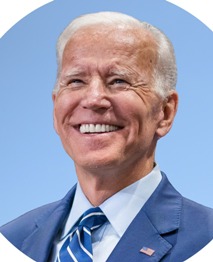Joe Biden Is the 35th Candidate to Set a Presidential Popular Vote Record
A new popular vote record has been set in 70 percent of presidential elections since 1824
 Several accolades have been bestowed by the media to Joe Biden for his 2020 victory – defeating an incumbent, winning a majority of the votes, picking off two states Democrats had not carried since the 1990s, and being the first nominee to win 70 million (then 75, 76, 77, 78 million) votes.
Several accolades have been bestowed by the media to Joe Biden for his 2020 victory – defeating an incumbent, winning a majority of the votes, picking off two states Democrats had not carried since the 1990s, and being the first nominee to win 70 million (then 75, 76, 77, 78 million) votes.
In the end, Biden will perhaps close in on as many as 80 million votes.
And while it is true that the former vice-president will own the record for the most votes ever received to date in a presidential election, this is perhaps his most unremarkable achievement of the cycle.
Biden will join 25 other nominees who have collectively set the record for the most popular votes 35 times over the last two centuries.
Since 1824, the first cycle in which there is reliable popular vote data, a new popular vote record was set in 35 out of 50 cycles, or 70 percent of the time.
This should not be surprising considering the passage of time saw the addition of new states, the expansion of the eligible electorate (by race, gender, age, criminal history status), a continued increase in population, and – in 2020 – a significantly larger window and more opportunities for the electorate to vote in most states.
In fact, during the first 22 elections since 1824, a new popular vote record was reached in every cycle.
Andrew Jackson owned the first three records during his campaigns of 1824 (151,363), 1828 (642,806), and 1832 (702,735).
Other notable marks include:
- 1840: William Harrison (1,275,583) and Martin Van Burn (1,129,645) were the first to cross one million
- 1864: Abraham Lincoln was the first to hit two million (2,211,317) despite nearly a dozen states seceding from the Union
- 1868: Ulysses Grant was the first to pass three million (3,013,790)
- 1876: Samuel Tilden (4,286,808) and Rutherford Hayes (4,034,142) were the first to pass four million
- 1888: Grover Cleveland (5,538,163) and Benjamin Harrison (5,443,633) were the first to cross five million
- 1920: Following the passage of the 19th Amendment, Warren Harding was the first to pass 10 million (16,166,126)
- 1928: Herbert Hoover was the first to reach 20 million (21,428,584)
- 1952: Dwight Eisenhower was the first to pass 30 million (34,075,529)
- 1964: Lyndon Johnson was the first to cross 40 million (43,129,040)
- 1984: Ronald Reagan was the first to break 50 million (54,455,472)
- 2004: George W. Bush was the first to pass 60 million (62,039,527)
That said, Biden’s achievement is not quite as mundane as the above data initially suggests.
Despite a continued increase in population, Biden is just the sixth nominee during the last 15 cycles to set a popular vote record since all 50 states and Washington D.C. began voting in 1964.
Biden joins Lyndon Johnson in 1964 (43,129,040), Richard Nixon in 1972 (47,168,710), Ronald Reagan in 1984 (54,455,472), George W. Bush (62,039,572) in 2004, and Barack Obama in 2008 (69,499,428).
[A few potential popular vote record holders were possibly thwarted by notable third party candidacies such as Ronald Reagan in 1980 and Bill Clinton or George H.W. Bush in 1992].
Perhaps even more notable about the 2020 cycle is the 73+ million votes (and counting) received by Donald Trump as the runner-up – the second largest tally in history.
In only 15 of 50 cycles since 1824 – and in just two cycles since 1924 – has the second place finisher received the second most popular votes in presidential election history.
The last to do so was John Kerry in 2004 (with 59,027,115 votes). Charles Hughes in 1916 (8,549,700) and James Cox in 1920 (9,140,256) are the only other two candidates to have done so since the 19th Century.
Follow Smart Politics on Twitter.

[…] Smart Politics previously challenged the notion that these records were particularly remarkable; Biden joined 25 other nominees who had collectively set the record for the most popular votes 35 times over the last two centuries. […]